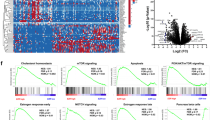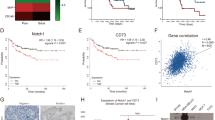Abstract
Notch3 is one of the four Notch receptors identified in mammal, but its role in human pancreatic cancer remains poorly characterized. In this study, we sought to determine the effect of suppressing Notch3 expression on the chemosensitivity to gemcitabine in human pancreatic cancer cell lines BxPC-3 and PANC-1. RNA interference was used to suppress Notch3 expression. Gemcitabine-induced cytotoxicity was determined by MTT. Cell apoptosis was measured by flow cytometry. Caspase 3 activity was assayed using a Caspase Fluorescent Assay Kit. The effect of Notch3-specific siRNA on PI3K/Akt activity was also quantified. Notch3-specific siRNA suppressed Notch3 expression, and furthermore increased gemcitabine-induced, caspase-mediated apoptosis. The suppression of Notch3 expression decreased the average IC50 in BxPC-3 and PANC-1 cells treated with gemcitabine. PI3K/Akt activity was decreased by the suppression of Notch3 expression. Taken together, these data demonstrated that Notch3 is a potential therapeutic target for pancreatic cancer, and PI3K/Akt is a key signaling component by which activation of the Notch3 signal transduction pathway protects pancreatic cancer cells from chemotherapy-induced cell death.




Similar content being viewed by others
References
Fryer RA, Galustian C, Dalgelish AG. Recent advances and developments in treatment strategies against pancreatic cancer. Curr Clin Pharmacol. 2009;4(2):102–12.
Jonckheere N, et al. Tumour growth and resistance to gemcitabine of pancreatic cancer cells are decreased by AP-2alpha overexpression. Br J Cancer. 2009;101(4):637–44.
Nickoloff BJ, Osborne BA, Miele L. Notch signaling as a therapeutic target in cancer: a new approach to the development of cell fate modifying agents. Oncogene. 2003;22(42):6598–608.
Miyamoto A, Lau R, Hein PW, Shipley JM, Weinmaster G. Microfibrillar proteins MAGP-1 and MAGP-2 induce Notch1 extracellular domain dissociation and receptor activation. J Biol Chem. 2006;281(15):10089–97.
Radtke F, Wilson A, Mancini SJ, MacDonald HR. Notch regulation of lymphocyte development and function. Nat Immunol. 2004;5(3):247–53.
Maillard I, Adler SH, Pear WS. Notch and the immune system. 1. Immunity. 2003;19(6):781–91.
Maillard I, Fang T, Pear WS. Regulation of lymphoid development, differentiation, and function by the Notch pathway. Annu Rev Immunol. 2005;23:945–74.
Real PJ, Ferrando AA. NOTCH inhibition and glucocorticoid therapy in T-cell acute lymphoblastic leukemia. Leukemia. 2009;23(8):1374–7.
Roy M, Pear WS, Aster JC. The multifaceted role of Notch in cancer. Curr Opin Genet Dev. 2007;17(1):52–9.
Dotto GP. Notch tumor suppressor function. Oncogene. 2008;27(38):5115–23.
Baek SH, et al. Zinc-induced downregulation of Notch signaling is associated with cytoplasmic retention of Notch1-IC and RBP-Jk via PI3k-Akt signaling pathway. Cancer Lett. 2007;255(1):117–26.
Meurette O, et al. Notch activation induces Akt signaling via an autocrine loop to prevent apoptosis in breast epithelial cells. Cancer Res. 2009;69(12):5015–22.
Kurreck J. RNA interference: from basic research to therapeutic applications. Angew Chem Int Ed Engl. 2009;48(8):1378–98.
Hu Y, et al. Inhibition of hypoxia-inducible factor-1 function enhances the sensitivity of multiple myeloma cells to melphalan. Mol Cancer Ther. 2009;8(8):2329–38.
Pauwels B, et al. The role of apoptotic cell death in the radiosensitising effect of gemcitabine. Br J Cancer. 2009;101(4):628–36.
Zhou H, Li XM, Meinkoth J, Pittman RN. Akt regulates cell survival and apoptosis at a postmitochondrial level. J Cell Biol. 2000;151(3):483–94.
Simon PO Jr, et al. Targeting AKT with the proapoptotic peptide, TAT-CTMP: a novel strategy for the treatment of human pancreatic adenocarcinoma. Int J Cancer. 2009;125(4):942–51.
Gramantieri L, et al. Aberrant Notch3 and Notch4 expression in human hepatocellular carcinoma. Liver Int. 2007;27(7):997–1007.
Doucas H, et al. Expression of nuclear Notch3 in pancreatic adenocarcinomas is associated with adverse clinical features, and correlates with the expression of STAT3 and phosphorylated Akt. J Surg Oncol. 2008;97(1):63–8.
Dang L, et al. Notch3 signaling initiates choroid plexus tumor formation. Oncogene. 2006;25(3):487–91.
Akiyoshi T, et al. Gamma-secretase inhibitors enhance taxane-induced mitotic arrest and apoptosis in colon cancer cells. Gastroenterology. 2008;134(1):131–44.
Gazzaniga P, et al. Gemcitabine-induced apoptosis in 5637 cell line: an in vitro model for high-risk superficial bladder cancer. Anticancer Drugs. 2007;18(2):179–85.
Nefedova Y, Sullivan DM, Bolick SC, Dalton WS, Gabrilovich DI. Inhibition of Notch signaling induces apoptosis of myeloma cells and enhances sensitivity to chemotherapy. Blood. 2008;111(4):2220–9.
Tassone P, et al. Zoledronic acid induces antiproliferative and apoptotic effects in human pancreatic cancer cells in vitro. Br J Cancer. 2003;88(12):1971–8.
Author information
Authors and Affiliations
Corresponding authors
Additional information
Jun Yao and Cuijuan Qian contributed equally to this work.
Rights and permissions
About this article
Cite this article
Yao, J., Qian, C. Inhibition of Notch3 enhances sensitivity to gemcitabine in pancreatic cancer through an inactivation of PI3K/Akt-dependent pathway. Med Oncol 27, 1017–1022 (2010). https://doi.org/10.1007/s12032-009-9326-5
Received:
Accepted:
Published:
Issue Date:
DOI: https://doi.org/10.1007/s12032-009-9326-5




